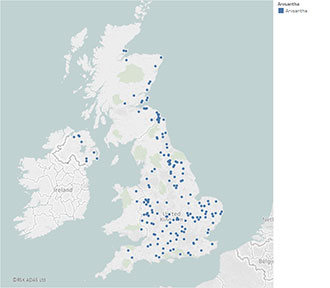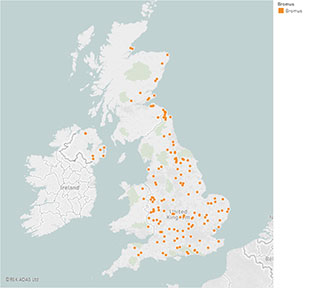New farmer-led field lab to control brome grass
New farmer-led field lab to control brome grass and prevent herbicide resistance
resistance
Arable farmers are invited to investigate methods for controlling the different species of brome grass in a new field lab with Innovative Farmers and ADAS.
The new farmer-led trial will look to identify methods that help slow or prevent herbicide resistance amongst increasingly widespread weeds – with surveys showing sterile brome to be the second most problematic grass weed in the UK, after black-grass.
The not-for-profit network Innovative Farmers, which enables farmer-led research, will connect farmers and agronomists with researchers from ADAS to identify when the weed typically emerges in the field, and what cultivation types, depths and timings are most effective in controlling it.
The field lab is part of a larger ADAS project investigating UK brome species, which was set up due to a lack of information on brome species and is funded by the Agriculture and Horticulture Development Board (AHDB).
The field lab will look to identify when brome grass emerges in the field, and what cultivation types, depths and timings are most effective at controlling the weeds.
Laura Davies, research scientist at ADAS, said: “Results from our 2017 survey showed that the incidences of brome weeds are increasing in UK arable farming. Although sterile brome is still the most wide-spread species, great and rye brome populations are also increasing and, along with meadow bromes, all are becoming harder to control. With ALS and ACCase herbicide  resistant brome populations present in mainland Europe we are keen to prevent herbicide resistance developing in UK bromes before they become as problematic as black-grass. We want to look at the best non-chemical ways to control bromes and help prevent resistance.”
resistant brome populations present in mainland Europe we are keen to prevent herbicide resistance developing in UK bromes before they become as problematic as black-grass. We want to look at the best non-chemical ways to control bromes and help prevent resistance.”
A meeting is being held on Wednesday 19 June for farmers to find out more about the field lab.
The meeting will be held in in Hereford, but farmers in other areas are invited to get in touch as an additional meeting may be arranged if there is enough interest in another area of the country.
To find out more about the field lab and event, contact info@innovativefarmers.org or visit Eventbrite.
More information will be available on the Innovative Farmers website as the trial develops. Visit www.innovativefarmers.org to join the network for free and access open source information on this field lab and others taking place around the country.
- Log in to post comments

